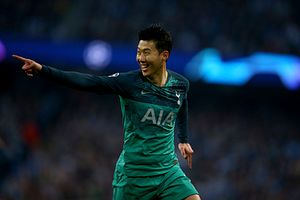During the 2018 FIFA World Cup in Russia, the South Korean (Korea Republic) national men’s football (soccer) team surprised the world: They defeated the 2014 reigning champions, Germany, eliminating them from the group stage of the tournament for the first time since 1938. The player who famously buried Germany’s hopes of advancing with a goal in the 96th minute was none other than one of South Korea’s most valuable cultural exports, Son Heung-min.
Son is a 26-year-old striker playing for Tottenham Hotspurs in the Premier League and the captain of South Korea’s national football team. Beyond but still connected to his performance on the pitch, Son represents a much wider set of phenomena as a new, unofficial poster child of Korean culture. Worldwide sensations such as Korean pop (K-pop) music have become one of Korea’s largest exports, and Son currently has the sports spotlight for good reason.
On the pitch, Son has a long and growing list of accolades from this Premier League season alone. He christened New White Hart Lane with its first goal, was named the London Premier League 2019 Player of the Year, and received Tottenham’s 2018/19 Player of the Season and Goal of the Season awards. Perhaps on the largest stage yet, he is set to compete in the UEFA Champions League Final on June 1 against rival English club Liverpool.
Son’s presence at Tottenham has led to a heightened focus on South Korean football. Seeing Son play for the Spurs is now a bucket list item for Koreans visiting London. Although you may see a rare French, Belgian, or even an English flag at a match, fans with Korean national flags can be seen at all Tottenham matches. Following Tottenham’s unbelievable 4-3 comeback over Ajax in the semi-final of the UEFA Champions League, Son reacted that this win was not only one of his best memories, but also “history for… my country and also for Tottenham.”
Above all, Son has attempted to retain his connection with his home country despite his putting down roots in the United Kingdom. Beyond playing for the national team, he has used his fame to promote one of his sponsors, Gillette, to contribute to childhood cancer research in Korea, and has also donated 100,000 pounds ($126,000) to victims of a forest fire in Gangwon, Son’s home province. When asked if he is an ambassador for his country, Son replied, “I have to be. The time difference is big and people still watch the games. I have to pay back. I take a lot of responsibility. This is what I am enjoying.”
Son’s commitment to represent his country on the Korean national team, however, has come with sacrifices. While away at the 2019 AFC Asian Cup in the UAE in January, Son missed several Premier League matches for Tottenham. In late January, Chelsea FC and Tottenham came head to head in the second leg semifinal of the Carabao Cup, coming off a previous 1-0 win for Tottenham at Wembley. With the absence of Son, Harry Kane, and Dele Alli (the latter two out with injuries), Tottenham lost the semi-final in a shootout. Later that same week, with the same missing players, Tottenham lost to Crystal Palace in the fourth round of the FA Cup. After an unexpected Korean loss in the quarterfinals of the AFC Asian Cup, Son returned to London feeling “physically drained.” That didn’t stop him from helping the Spurs to a 2-1 win against Watford at Wembley, scoring the equalizer in the 80th minute.
Son’s success at the national and professional levels of football has led to criticism alongside praise. In South Korea, there is a 21-month mandatory military service for all Korean men between the ages of 18 and 28. This service has become a pillar of Korean nationalism and coming into adulthood for young Korean men. At the 2018 Asian Games, held in Indonesia, Son led Korea to win gold and subsequently received exemption from military service. This exemption meant he could continue on his contract with the Spurs. While several Korean K-pop boy bands have been criticized for eluding mandatory service, Son — and other successful South Korean athletes — seems to largely avoid the same level of public scrutiny.
Son’s strong presence in both English and international news provides an opportunity to analyze how he and other minority players are depicted. Son serves as a noteworthy example of how successful Asians are portrayed in sports and other realms of entertainment. In the Premier League, commentators often refer to players using ethnicity-based jargon: European players are typically discussed in terms of skill level and technique; black players are commonly praised for being “powerful” and beast-like; Latino players are “tricky” with a connotation of dirty play; and Asians, including Son, are “hard workers.” The trope of the “reluctant” superstar is another projection of the stereotyped Asian ideal of humility. One of Son’s runs and goals was animated to represent the Sonic the Hedgehog video game, playing off his origins and nickname, “Sonny.” Although Son seems hesitant to detail his own experiences with racism in the U.K., his experience will no doubt be shared by the influx of Asian players to Western leagues. Stereotypes of Asian players both on and off the pitch will be continually challenged as the pool of players diversifies.
Overall, Son’s popularity has created a type of reverse effect on the national-club spheres in football. Typically, fans might watch league play because they enjoy a particular Brazilian player. Son has flipped the script here, with fans tuning in to watch the Korean national team after becoming a fan watching his rise at Tottenham. Saturday’s Champions League Final will only add to the emotional investment of the world into a South Korean footballer, and conversely the investment of South Korea into European football.

































